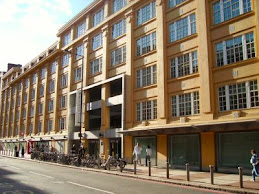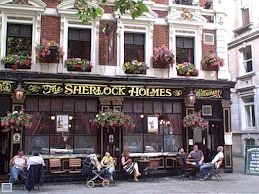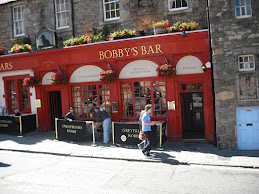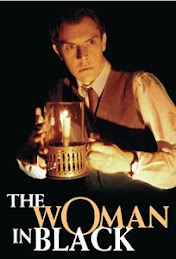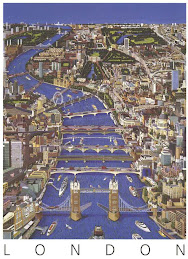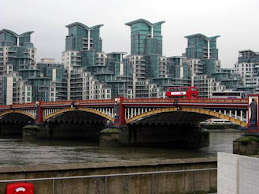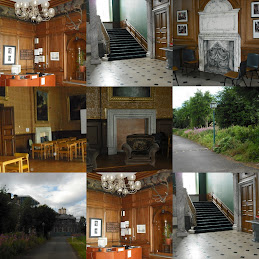My Visit to a Public Library in Westminister: Getting There
The city of Westminister libraries seemed to be more ‘uptown’ or more accessible from London central. This library was housed in an old historic building that was quite beautiful from the exterior. I ventured on the ‘Underground’ crossing over three different train rides with ease and was a swift trip. By now, I am not afraid of using this mode of transportation and am intrigued with it. The unknowns of traveling in this fashion is coming above ground to a world unknown to me and trying to locate what may be a small or large library in a sea of tremendous buildings and a whirlwind of people and cars screaming past on busy streets. I was starved to death, but made my way past many eateries on a mission to find this library. I came straight to Madame Tusseauds Wax Museum. I thought about taking a quick tour through this touristy hot-spot, but there was a long line of noisy groups of children and I just had to leave! I could hear my father’s voice in the back of my mind telling me to make sure to visit the wax museum and wondered if I should lie about visiting or come back again. I moved quickly past that thought and headed for what I believe to be a police officer who was embarrassed when I asked him where the library was. I hope I did not give him a “are you crazy; you don’t know where your library is!” kind of look. I walked ahead and saw a man sweeping the street and figured he was a local, so I asked him and he definitely knew. Not only was I on the wrong side of the street, but I walked out of the station and headed in the wrong direction. But, I did not travel far and was now on track! All I had to do was wait 20 minutes now for the library to open, as it opened at 1:30 pm on Sundays.
The Stranger:
The library was next to a fantastic court house. I sat on its steps and an older gentleman engaged in some conversation with me. I could tell he was lonely and could feel his presence and need to speak with me before he finally made the decision to approach me. I suppose it is body language I can read. I was a bit leary at first, but realized he was alright and I was on a very busy street anyways with other patrons waiting outside as well. This gentleman told me he was a retired substitute teacher and that he was about to receive his pension. He told me about his career and asked me about my own and where I was from. We discussed his travels to America and our educational system. I understood him to be someone of little monetary means. He did not at all want to teach again and told me how difficult it can be. Some things are just universal I think. He talked as though he was concerned about money and came to the library, especially on Sundays, because there was not much to do and that he basically had to spend his money on things other than entertainment. He is one of those patrons that I meet that use the library leisurely for entertainment and to feel a part of the community. He was a very nice man, yet I made sure to leave right at the strike of 1:30, say goodbye, and it was lovely to meet him and I wished him well. Why am I discussing this gentleman? Upon entering the main level of the library (there are 2 levels), I came to a computer with a catalog that offered access to other online resources, such as the Community Information Database, as we have at the public library I work at. I wished I could have located this elderly gentleman to show him some of the resources I found for the elderly, as there were many. I am not sure of how computer-savvy he is, but I would think that based upon his age that he may not know how to access information in this manner. I felt like there may have been services, programs, or local groups found at this library that he could get information about. I was glad to be here and glad that I feel a need to help others with information. It is really good medicine for me anyway!
Downstairs:
The bottom floor of the library is the lending part of this public library. I examined a wonderful piece of equipment that basically allowed patrons to independently:
• Borrow
• Renew
• Return Items
• Pay Fees
This equipment was box-like with four buttons for each feature. The middle of the equipment offered an opening space to place/insert items or scan them and I observed each patron to receive a printed receipt of each transaction. I would love to see this type of innovative technology made available at home as it saves the time of the patrons and the staff, seemed to be quite efficient, and just makes good since! It offers another means of servicing patrons and offering them an avenue to work independently. Some patrons are afraid of asking the librarians questions or fear they may be bothersome with their questions. This at least offers the patrons a mode of servicing themselves and if any questions are lingering, the staff is available to them.
The collection on the bottom floor offered DVDs,CDs and books on a variety of subjects, similar to what you would find in the United States. Of interest to me were topics on parenting, the body and belief. The Children’s Library and the Teen Zone were placed together in the back of this level. There was a large Inquiries Desk with a mix of younger and older library workers who were nice and helpful when approached. The Catalog that was reviewed to peruse the Community Information Database also offered eLibrary access to the collection, eResources and the library Gateway to Resources. The catalog was browsable by subject, and searches could be conducted of the children’s collection, ‘My Account’, and online reference materials.
Community Information Database:
Of specific interest to me was the community database mentioned before because it really caters to the community, with very valuable information resources such as descriptions of services with an offer of contact information for people on a host of subjects that is available to print and accessible online given a library card and password. Of relevance to special needs populations, the subject heading of 'Housing' offered patrons a list of many resources through the following subheadings: Disabled; Accommodations; Grants; Homeless; Family Services; and Housing Advice. For 'Life Events' the following subheadings offered a rich supply of resources: Bankruptcy; Mental Incapacity; Unemployment; and Retirement for examples. For 'Social Issues': Advice; and Equality. For 'Community and Living': Special Needs; Charities; Interpreting; and Mediator. For 'Jobs and Careers': Job Centers and Clubs; Employment, and Job Advice. For 'Policy and Public Safety': Emergency; Victim Support; Public Safety; and Crime and Police. For 'Leisure and Culture': Literacy Groups; Information; Older People and Libraries. For 'Social Care Advice': Health & Safety; Social Services; Social Care; Health Centers; Social Advice; Health and Medicine and Home Help.
Upstairs:
Upon entering the second level of this public library that was labelled 'Information' from the entering door, I observed many computer stations. There was an area for printers and copy machines, with an offer of a large table and chairs. Non-Fiction was located on this level and offered many subjects that were very clearly labelled and spaced upon shelves with the offer of ample space for patrons to walk past and wheelchairs to move through. The only subject that I could not figure out was O.U. I should have picked up a book from this section, but moved right past as I figured it must be something local that is understood among residents? The Help and Advice area offered an Exchange Group Training. No one manned this desk and a sign stated to ask the librarians if there were any questions. I do not know if the Exchange Group is an outside group or library staff, but it advocated to “empower people” and the signage stated that it was a free service where confidential advice is given and can be done so in sessions. The “Ask Staff for Details” was located in several areas of the library. This training center that must be closed today posted that it was for people of all ages and social sectors. I found an area with pamphlets and flyers. There was a listing of classes upcoming, so I collected as much as I could on the training center and other services and programs of the library and related/cooperative service organizations. Of the programs I took note of were: First Time Online; Are you Looking for a New Job?; and National Test & ECDL Tests. Also, there were signs nearby that were posted on the walls that PC usage was free for one hour.
This library had many resources for business and job related training. I belive that this library offers a storehouse of many great resources for the public! The Periodical section offered large wooden sitting carrels that were private for reading. Newspapers were in full stock, as well as a range of magazines to suit the tastes of the young and the old. As in the rest of the library, everything was well labeled. I even thought that maybe everything was “over-labelled!” Movement was assured around this section and I could envision a disabled person having no problems moving about here. Next to periodicals were wall postings and tables of more community and library events in the form of posted flyers and free hand-outs. The walls were decorated with posters advertising various library services. On my way out of the library, I took note of more signs directing patrons to the staff for help with the Internet. Weekly sessions or Drop In Advice Sessions were posted as taking place on Wednesdays at the Marylebone Information Service Desk. The library also offered the public the opportunity through creative advertising to: get confident; get ready; and get back to work! Through sessions at the library on Tuesdays, to gain knowledge when patrons are unsure what to do, the 'First for Work' program seemed a helpful service.
Other services the librarians offer patrons here at the Marylebone Library in the Westminister borough of London, is gaining resources to help with problems such as: tax credits or benefits; problems with your children’s school; debts out of control; treated unfair at work; problems with the landlord; and living on a low income or benefits. While the librarians are not there to actually solve patron problems, they have nicely gathered and organized resources and developed services and programs that strive to give advice or keys to solving issues. This advice is offered to patrons Monday through Friday from 9am to 6:30pm. (www.communitylegaladvice.uk)
Handicap accessibility by ramps was made available for patrons to the library and the various zones within, yet only a stair lift was offered inside. Special software for the visually and hearing impaired was offered with special Zoom features to enhance the size of the text. There were also special keyboards with larger keys to aid as well.



